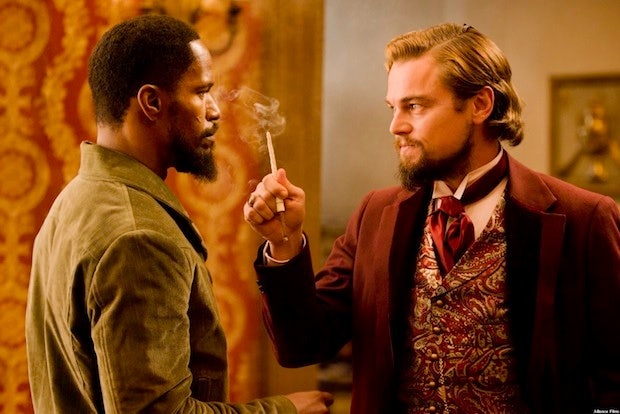Content, Promotion, And Timing All Factors in Tarantino's China Flop#

A scene from Django Unchained.
Quentin Tarantino's Django Unchained finally made its way back into China's theaters recently after its abrupt cancellation by authorities earlier this spring, which in some cases actually involved shutting screens off mid-showing. However, the film's China earnings of about $2.6 million have been called "nothing to write home about" by The Hollywood Reporter, and seem like small change in contrast to Iron Man 3's $120 million. The Tarantino film finally secured its opening after Iron Man 3 had been showing for almost two weeks, yet on Django's opening day, it only grossed around $600,000, a number dramatically lower than Iron Man 3's intake for the same day and a very small portion of the film's otherwise high global earnings.
When looking to why Chinese audiences spurned Django while providing Iron Man 3 with record-breaking profits, several key factors stand out that likely contributed to the stark difference.
First of all, Django's late release date most likely had a profound effect on its profits due to the opportunities for bootlegged versions to leak on pirated DVDs and online. While Iron Man 3 opened across the world within a relatively limited frame of time, Django Unchained had to wait for a painfully long period after its global release to arrive in China, with the date being pushed back several times. China's State Administration for Radio, Film, and Television (SARFT) originally announced a May 9 re-opening date for the Tarantino flick, but later changed it to May 12, resulting in what Robert Cain at China film blog Chinafilmbiz referred to as "death by a thousand cuts."

A scene from the Iron Man 3 Forbidden City promotion extravaganza. (Reuters)
This lateness wasn't the only factor working against Django. Iron Man 3's May 1 China premiere was still later than its producers had hoped for, but there were several other issues at play that gave it a marketing advantage over Tarantino's drama. One of the main problems faced by Django was its content--in terms of both a presence of aspects that would anger censors such as nudity and violence, and an absence of plotlines that would be relatable in China. While Django was somehow not properly vetted for content that would be considered "inappropriate" by state regulators and thus pulled at the 11th hour of its original showing date, Iron Man 3 went to great lengths to make sure that the film would not only be approved by censors, but also added in special "China-only" scenes that would appeal to Chinese audiences. On top of this, it was possible that Django's setting in pre-Civil War America did not culturally resonate with audiences in the way that a mass-market blockbuster like Iron Man 3 was able to.
Thirdly, Iron Man 3 made much stronger promotion efforts in China than Django, which, unlike an alien cultural context, was certainly a factor that Django could have had more control over. Hosting a star-studded Forbidden City spectacular before the movie showed in theaters, Iron Man 3 pulled out all the stops to gain attention from Chinese audiences, while Django focused its Asia marketing in Japan and South Korea despite the fact that star Leonardo DiCaprio is well-known to Chinese audiences.
The decision to show Django in China by The Weinstein Company is a reflection of the pressure all Hollywood studios are feeling to tap into the film market early, even if their films don't have cultural resonance. Harvey Weinstein, co-founder of the company, has not said why Django was pulled at such a late point in the vetting process, but noted that cuts to the film's more scandalous scenes were made because China "is a big audience and I don't think any of us want to ignore that audience either for a few cuts in the movie."
The contrasting results for the two films show that although some Hollywood companies are successfully managing their way through the complicated terrain of China's film industry, others are falling short even when they manage to fall within China's tight quotas. For quality-focused filmmakers like Quentin Tarantino who are comparatively less willing to compromise on content than directors mainly concerned with the bottom dollar, preservation of a film's original content, including not only "inappropriate" but politically sensitive messages, may become an increasingly difficult financial decision if China's censors continue their strict control over the country's film market.